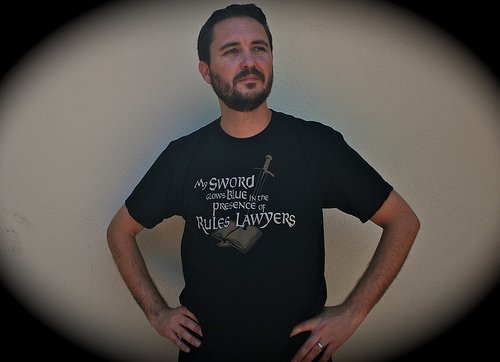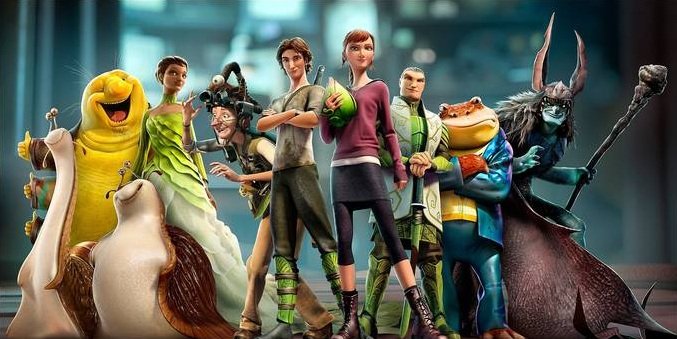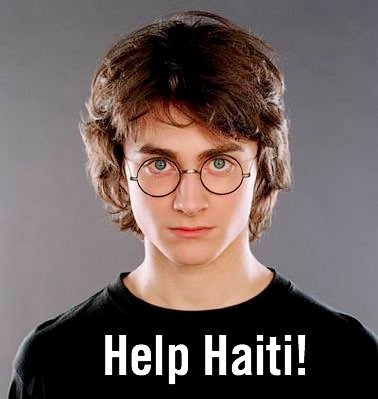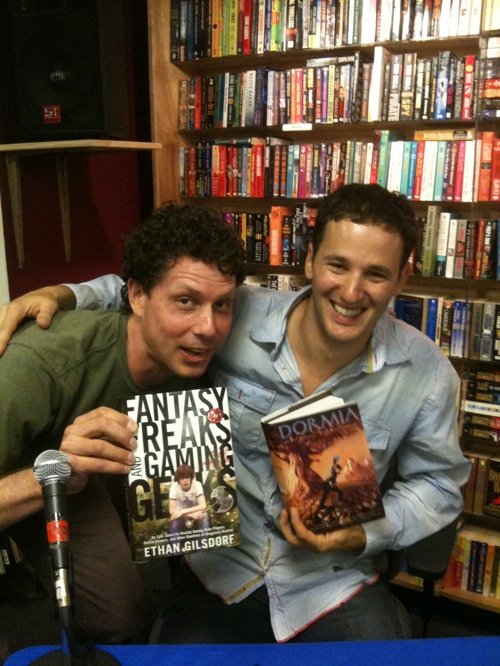How is a lawyer like a wizard? D&D goes to Harvard (and so do I

 Wil Wheaton's dream: to have a T-shirt that says "My sword glows blue in the presence of rules lawyers."
Wil Wheaton's dream: to have a T-shirt that says "My sword glows blue in the presence of rules lawyers."
How is a lawyer like a wizard? How does a courtroom resemble an epic battle? How is a casebook like the Dungeon Master's Guide?
I'm excited to be part of the "Berkman luncheon series" to give a talk called "How Dungeons & Dragons and Fantasy Prepare You for Law and Life," February 11, 2014, 12:30pm, at Harvard's Berkman Center for Internet & Society.
For this event, I'll be appearing in conversation with Jonathan Zittrain, a Harvard wizard (Professor at the Harvard Law School, Harvard Kennedy School of Government, and Professor of Computer Science at the Harvard School of Engineering and Applied Sciences, and co-founder of the Berkman Center for Internet & Society --- whew!).
We'll discuss such issues, with the audience, as: How the skills, rulebooks and "laws" required to play D&D --- whether understanding complex "to hit" charts or inventing the backstory of an evil Witch King -- can especially apply to law students; the push and pull of laws and rules vs. imagination in a game like D&D, a book series like Harry Potter, or any fantasy world; and the role of the dungeon master/author/world-builder in the consistent (or inconsistent) application of these rules and standards, and how this all might apply to the imaginary world of law, too.
It is free and open to all, but please an RSVP here. You can also see it webcast live here as well, where you can also get more information.
More info on Ethan-themed events here.
What's down that rabbit hole or in that wardrobe? ‘Epic’ follows tradition of children’s fictions bridging earthly, fantasy realms
 What's down that rabbit hole or in that wardrobe?: ‘Epic’ follows tradition of children’s fictions bridging earthly, fantasy realms
What's down that rabbit hole or in that wardrobe?: ‘Epic’ follows tradition of children’s fictions bridging earthly, fantasy realms
In the just-opened animated adventure film, “Epic,” a teenage girl named Mary Katherine (voiced by Amanda Seyfried) has effectively been abandoned. She arrives in the country to reconnect with her harebrained dad (Jason Sudeikis), a nerdy scientist obsessed with finding a woodland kingdom of miniature creatures. Grieving the loss of her mother, Mary Katherine, or “M.K.,” needs her father more than ever. But her dad’s belief in a secret world makes him all the more distant. “I’ll be right here,” M.K. huffs. “In reality.”
Naturally, M.K.’s ideas about magical realms are about to change. Stumbling into the woods, she snatches what looks like a glimmering leaf as it drifts down from the trees. The “pod” glows brighter in her hands, and then, KA-POW! our heroine is transported (and shrunk) to the hidden land of the Leafmen. There, she finds her purpose among a race of tiny people who, armed with bows and swords and mounted on sparrows and hummingbirds, protect the forest from the baddies in, yes, an ongoing battle between the forces of good and evil.
Movies about worlds disconnected from our own are commonplace. Think of the many science fiction and fantasy narratives that lie along the “Star Wars” to “The Lord of the Rings” continuum. These separate realities are filled with orcs and wizards, siths and spaceships. Humans may live there, but we Earthlings can’t visit them. No magic door leads from Boston to Tatooine, no trip down a rabbit hole or along the Red Line arrives in Middle-earth.
“Epic” belongs to a different but equally longstanding tradition of fiction that bridges our world to other realms. Via some gateway, a journey is made to a kind of Neverland or Narnia. The trope is as old and dark as the burrow in “Alice in Wonderland” and Dorothy’s twister in “The Wizard of Oz.” You can follow these tunnels from “Labyrinth” to “Pan’s Labyrinth,” through “Harry Potter” and “Percy Jackson and the Lightning Thief” and beyond to every story that maps that liminal space between us and some parallel place.
As sophisticated and tech-savvy as we’ve become in the 21st century, apparently we still need to believe in hidden worlds that coexist with the real world. In fact, we might need them more than ever. As we get more attached to our digital devices, our traditional spells don’t work anymore. Satellites have mapped every square inch of the planet; Google conjures an explanation for everything. We’re disconnected from witchcraft, nature, and the mysterious. Myth and fairy story gain no purchase on our daily lives.
Consequently, as we’ve galloped from industrialism to post-industrialism to digitalism, we’ve seen an explosion of fantasy and adventure movies in the last 30 years — from “The Goonies” (1985) to “The Golden Compass” (2007) — which reconnect us to these concealed worlds. We cling to old stories, newly enhanced by advances in special effects whose verisimilitude makes these worlds feel more convincing than ever.
Read the rest of my story at Boston Sunday Globe
Harry Potter to the rescue

Geeks have hearts of gold.
I wrote some time ago about an effort to aid Haiti relief, spearheaded by an organization called the Harry Potter Alliance, which has long inspired Harry Potter fans to take action on real-world social issues like global warming and Darfur. Recently, it launched its largest fandom action, called Help Haiti Heal, to raise money for the victims of the Haiti earthquake.
Of course, the point was to raise a bunch of money in a time of need. But, on the sly, I think the effort helped show that so-called escapist pursuits like reading fantasy novels like Harry Potter, watching fantasy movies like Lord of the Rings, or participating in role-playing games can actually connect to the real world, too.
Heroic acts and derring-do involving wielding wands and swords and smiting evil-doers are all well and good in a book or movie. What makes this success so sweet is that the forces of gaming and fantasy and fandom can be wielded, too. And fans and gamers can be a powerful body indeed.
The effort is also a reminder that one reason we need fantasy is to remind us how to act in the real world. Perhaps society’s lack of a coming-of-age ritual explains the appeal. We have a driver’s license, and a drinking age, and we get married. But not much else. Fantasy genre fills this void, framing the hero’s journey in right and wrong, good and evil.
Moreover, books give hope in hopeless times --- like when calamity strikes. Fantasy is a genre people can read and retreat to and gather strength to face the real world. Refuge from oppression, personal or political, or wars or natural disasters like earthquakes all lay in the fairy world and the possibility of imagination. Fantasy keeps the spirit alive and kicking, and provides a blueprint for good behavior.
So thank you! Fans of all kinds have come together and raised over $110,000 for Partners In Health in Haiti... We’re chartering three cargo planes packed with 75,000 pounds of critical, life-saving supplies to thousands of people in Haiti.
The planes are going to be named Harry, Ron, and Hermione.
You can still donate here: http://www.thehpalliance.org/haiti/
Thank you!
Ethan Gilsdorf is the author of the travel memoir-pop culture investigation Fantasy Freaks and Gaming Geeks: An Epic Quest for Reality Among Role Players, Online Gamers, and Other Dwellers of Imaginary Realms.
a night with "Dormia"
Last night at the Brookline Booksmith, Jake Halpern and Peter Kujawinski read from (and acted out) their new YA/all-ages novel Dormia. The book tells the story of another young boy (not THAT young boy) with special gifts and a hidden lineage that he gradually figures out on a world-girdling quest.
Twelve-year-old Alfonso Perplexon has a sleepwalking problem -- sometimes he wakes up and find himself at the top of a tree or having accomplished some amazing feat. In his hometown of World’s End, Minnesota, the dad is out of the picture (a familiar theme in Star Wars, E.T., HP, and other boys-to-men coming of age stories).Alfonso and Mom carry on. Then a stranger comes to town, a quirky man who claims to be Alfonso’s long lost uncle. The man tells of the kingdom of Dormia, far in the Ural Mountains, and that Alfonso has the gift of "wakeful sleeping." This lost land is in trouble, and only Alfonso has a chance to save it. So out the door they go, headed for adventure, picking up oddball characters and mishaps along the way.
At the reading, Halpern did a masterful job play-acting some key scenes from the book, and Kujawinski deadpanned the tale of how this team of authors managed to write the book from the distance of New York, Paris, Israel and a Navajo Reservation in northwestern New Mexico. Their story inspired me to try my hand at spinning my own tale, or perhaps collaborating with my pal JP (the dude who taught me D&D; you can read about that in Fantasy Freaks and Gaming Geeks.)
And the funny thing is, there's a 12 year old boy gamer named Alex who I talk to in my book. And I was 12 when I began to play D&D. What's the attraction to age 12 and all this fantasy stuff?
 No longer 12 years old: Ethan Gilsdorf and Jake Halpern show off their books
No longer 12 years old: Ethan Gilsdorf and Jake Halpern show off their books
Harry Potter comes to Boston!
The Museum of Science in Boston made this announcement today:
"This fall, Harry Potter fans will get the chance to step inside the famous wizard's magical world through Harry Potter: The Exhibition, which opens at the Museum of Science, Boston on October 25, 2009, at 9 a.m. Tickets are now available online at mos.org or by calling 617-723-2500, 617-589-0417 (TTY). Visitors will be able to experience dramatic displays inspired by the Hogwarts™ film sets and see the amazing craftsmanship behind authentic costumes and props from the films. Harry Potter: The Exhibition will run in Boston through February 21, 2010."
Cool stuff includes "display Harry Potter artifacts in settings inspired by film sets, including the Great Hall, Hagrid's hut, and the Gryffindor common room" and "a 500-pound, 10-foot tall chess piece"
Great news. But it raises the question: what business does a science museum have displaying movie props and special effects displays? Don't get me wrong: I love these movie magic exhibits. The MOS hosted both a Lord of the Rings and Star Wars movie show. But I wonder if, in the words of Ioannis Miaoulis, President and Director of the Museum of Science, "This exhibit will spark their curiosity and imagination, leading them to experience the excitement of discovery that's also at the heart of the Museum's science and technology exhibits and programs."
Or maybe, just maybe, it will net the museum a crapload of money. Which isn't a bad thing. But I'd rather Miaoulis just call a spade a spade and say, hey, this is going to pay the heating bills and help update our cutting-edge technology displays that date back to the 1980s.
The best fantasy franchise is...
Harry Potter?
According to a poll conducted by the website Moviefone and Bebo, Harry Potter has been voted the Best Fantasy Franchise in a new Internet poll. The result are striking: Harry got 73 per cent of votes, Lord of the Rings got 16, Twilight eight and lowly Chronicles of Narnia nabbed just three percent of the votes. Of course, this is probably a classic case of short-term cultural memory loss. Because of the frenzy surrounding the Half-Blood Prince release, everyone has Harry on the mind. Had you asked folks at the height of Rings mania back in 2001-2003, you might have gotten a much different answer. And probably fewer teenage girls voting. The other issue being, none of the news reports of this poll stated how the data was gathered, how many or who was surveyed, or anything else about the methodology. Maybe only catholic girls schools were targeted in online banner ads showing a half-naked Daniel Radcliffe.
--- Ethan Gilsdorf, author of Fantasy Freaks and Gaming Geeks
wizard rock radio!
If you need your fix of Harry Potter-themed "wizard rock," look no further.... thanks to the coolness over at Paste magazine.
--- Ethan Gilsdorf, author of Fantasy Freaks and Gaming Geeks
Egad! someone who does not like Harry Potter?
Ok, so let's say you hate Harry Potter. Bryony Gordon, the author of this story (originally appearing in the Telegraph UK) bravely if foolhardily admits he'd enjoyed a blissful period thinking that Harry Potter did not exist at all, because no book or movie had been released in ages (ages for Harry Potter fans, anyway). "For two blissful years my life has been a Harry Potter-free zone. No talk of muggles, or quidditch, or Hogwarts or He-Who-Must-Not-Be-Named." And for this London resident, "nobody has made any really unfunny jokes about the train leaving from platform 9¾, which is good, because it means I have had less cause to hit people over the head with a rolled up newspaper." Yuk yuk.
Which just goes to show you, you can't force geekdom on anyone. You can't make a person like a book, a movie, a pop cultural phenom. But this author goes out on a limb a little further, to say, "it won't surprise you to learn that I don't understand grown adults who like Harry Potter... It's a bit sinister, actually. In my mind, you may as well sit on the train reading a Thomas the Tank Engine picture book making choo-choo noises." Then the "escape" claim: "I know that mature fans of Harry Potter claim it allows them to escape to another world, that it helps them to feel young again."
For me, there's nothing wrong with that. But for Mr. Gordon, I sense the kid's play that Harry Potter evokes is shameful.
Gordon cleverly exits on a joke "But when the first one came out I was 17 and by the time that the final movie instalment is released I will be 31. That doesn't make me feel young. It makes me feel really, really old. And there's nothing magic about that." And leaves me wondering if there's something else here, unexamined, that explains his aversion to all things Hogwarts.
--- Ethan Gilsdorf, author of Fantasy Freaks and Gaming Geeks